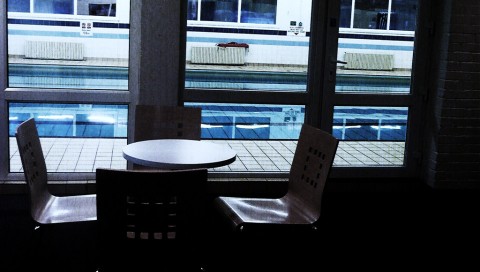Mary’s first child, a daughter, died in her sleep, six weeks old. Mary hadn’t slept more than an hour at a time since she was born, terrified of just that. She sat next to the crib all night, the side down, her hand always touching the baby, watching the little ducks on the blanket rise up, then fall, rise then fall. She knew it could happen to anyone, that babies died for no reason all the time. She’d read about it. So she wasn’t going to leave her baby’s side, wasn’t going to allow that to happen to her baby. No, she would be a good mother and watch. But after six weeks, after weekly showers, and cold take-out, and piles of laundry and snippets of sleep that just ratcheted up the tired, she stopped watching.
Her son was a toddler when he fell from the third story window, right through the screen. Just like Eric Clapton’s son, only there was no nanny. Mary was terrified of those screens, had read the stories, had stared at the warning on the screen handle that showed a toddler, male like hers, beginning to tumble head first. The drawing was horrible. Who dreamed up such a thing? A little shadow boy caught forever in the precise moment before his death. How many times had she imagined the same thing happening to her sweet boy? I’ll never leave him alone with the windows up, she thought. I can control this, she thought, imagining the moment Eric Clapton heard the news.
But toddlers are fast and unpredictable. And it was just a moment, just a moment in the other room folding laundry.
Mary had read once that if you imagine the worst it won’t happen.
Swimming lessons prevent accidents, which is why Mary signed her daughter up for them as soon as she could walk. She had learned you could never be too careful, you had to plan for every situation. But how do you plan for accidents not covered in lessons? How do you prepare, say, for an ice-skating party on the lake, mid-January, twelve nine year-olds and a handful of adults watching from the porch? You check the temperature; you go out on the ice the day before to test it, sneaking out at night so no one thinks you’re over-protective; you make your daughter watch a video on ice rescues, reminding her to lie flat and distribute her weight if the ice starts to crack. When she says relax, she’s a good swimmer, you tell her that her swimming skills will keep her alive for the first minute.
One minute, Mary said to her. That’s all you’ve got. It took them three minutes to get to the hole in the ice.
Mary’s son was abducted walking home from a friend’s house. He was fourteen and it was three in the afternoon. It was only three blocks. I’m fourteen, for God’s sake, he had said in the morning. I can walk three fucking blocks alone.
Don’t swear at me, Mary said. Can I help it if I worry? I’m your mother. It’s what I do. Look at what happens in the world every day.
I know what happens, he said. Believe me, I know.
Because I love you, Mary said. Because terrible, awful, unspeakable things happen.
I’ll be fine, he said. Please, he said. Please.
And just like in the papers, like that terrible story about the little Jewish boy coming home from day camp. Just like that boy in Florida who was in the park one minute and gone the next. Just like the boy from Kansas who disappeared from his own backyard.
Sitting at the kitchen table, Mary waits for her daughter to call. She lines up the salt and pepper shakers and the butter and the sugar dish. She turns the phone on then brings it to her ear, turns it off and sets it back down in front of her. She counts backward from fifty. She does it again. She puts her head in her hands and tries to remember what she hasn’t yet imagined.



 The core workshop of SmokeLong Fitness is all in writing, so you can take part from anywhere at anytime. We are excited about creating a supportive, consistent and structured environment for flash writers to work on their craft in a community. We are thrilled and proud to say that our workshop participants have won, placed, or been listed in every major flash competition. Community works.
The core workshop of SmokeLong Fitness is all in writing, so you can take part from anywhere at anytime. We are excited about creating a supportive, consistent and structured environment for flash writers to work on their craft in a community. We are thrilled and proud to say that our workshop participants have won, placed, or been listed in every major flash competition. Community works.